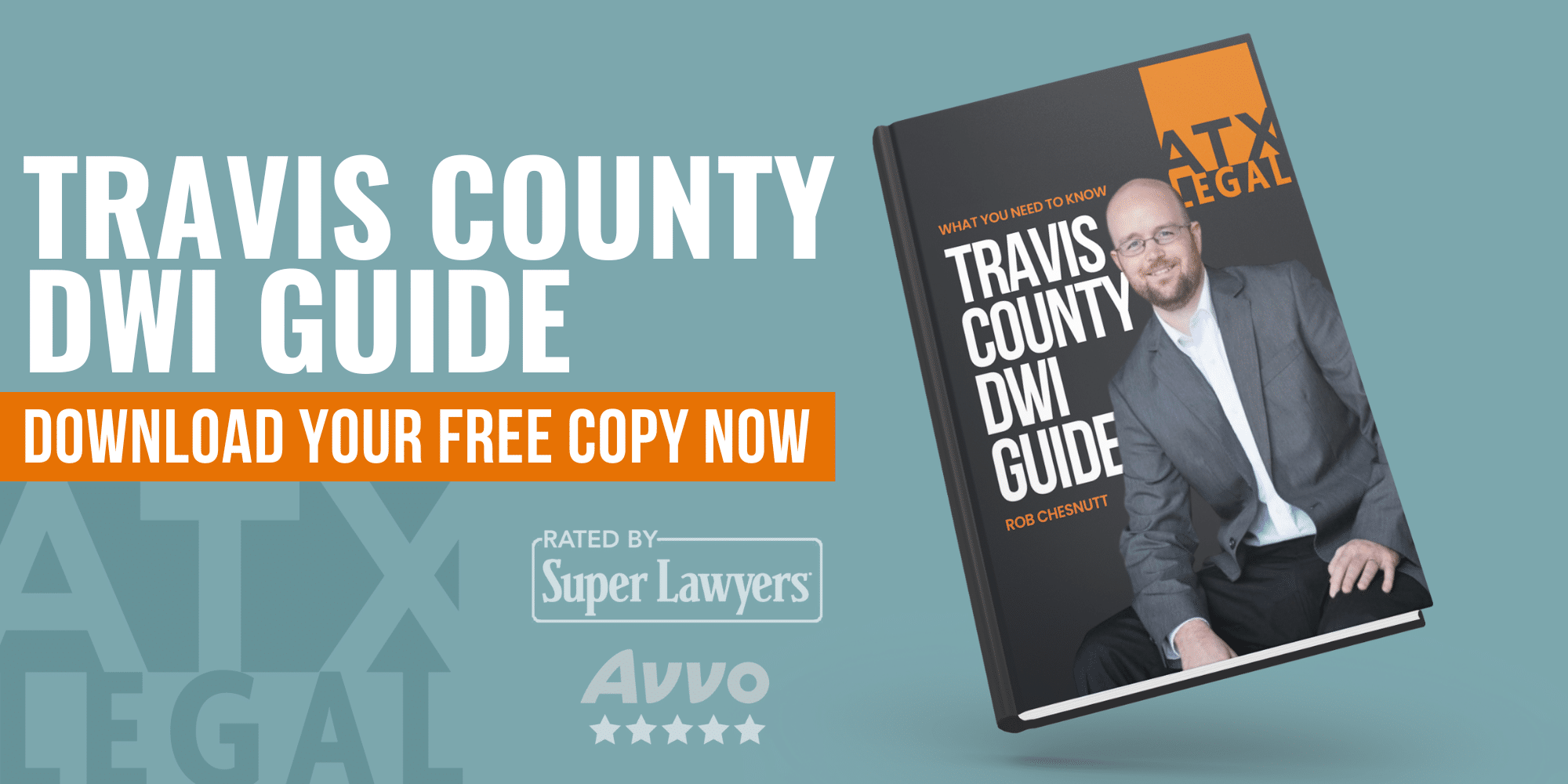Austin DWI Lawyer
DWI Charges When BAC is over .15
Driving while intoxicated (DWI) is a serious offense, more so when the Blood Alcohol Concentration (BAC) exceeds the .15 mark. This high BAC escalates the legal consequences one might face. It is charged as a Class A misdemeanor, rather than a class B misdemeanor for a typical DWI.
Despite this, there are ways to handle a DWI when over the BAC limit in Texas that limit the consequences of the DWI. For example, a reduction to a class B misdemeanor is often possible. Of course, this depends on the totality of the circumstances in your specific case. If you would like a free consultation with an experienced criminal defense attorney, fill out a contact form, or call/text 512-677-5003.
2023 Travis County DWI Guide
What are the laws specific to BAC over .15?
According to the Texas Penal Code 49.04, if it is proven that at the time of the offense, the person had an alcohol content of .15 or more, the DWI offense is enhanced and becomes a Class A misdemeanor. Under Texas DWI law, the penalties regarding driving while intoxicated with a high BAC over the .15 legal limit are more severe than those for a “regular” DWI. These laws are designed to discourage excessive drinking before operating a motor vehicle due to the increased risk of serious accidents. If an individual is convicted with a BAC over .15, the charge is elevated to a class A misdemeanor, and could potentially face enhanced penalties. For example, a fine up to $4,000, a jail sentence ranging from 72 hours to one year, and a license suspension for up to two years. Moreover, an ignition interlock device may be required to be installed at the offender’s expense. These are significant differences and are clearly aimed at deterring drivers from not only drinking and driving, but from heavy consumption prior to driving.DWI Charges When BAC is over .15
Driving while intoxicated (DWI) is a serious offense, more so when the Blood Alcohol Concentration (BAC) exceeds the .15 mark. This high BAC escalates the legal consequences one might face. It is charged as a Class A misdemeanor, rather than a class B misdemeanor for a typical DWI.
Despite this, there are ways to handle a DWI when over the BAC limit in Texas that limit the consequences of the DWI. For example, a reduction to a class B misdemeanor is often possible. Of course, this depends on the totality of the circumstances in your specific case. If you would like a free consultation with an experienced criminal defense attorney, fill out a contact form, or call/text 512-677-5003.

What are the laws specific to BAC over .15?
According to the Texas Penal Code 49.04, if it is proven that at the time of the offense, the person had an alcohol content of .15 or more, the DWI offense is enhanced and becomes a Class A misdemeanor.
Under Texas DWI law, the penalties regarding driving while intoxicated with a high BAC over the .15 legal limit are more severe than those for a “regular” DWI. These laws are designed to discourage excessive drinking before operating a motor vehicle due to the increased risk of serious accidents.
If an individual is convicted with a BAC over .15, the charge is elevated to a class A misdemeanor, and could potentially face enhanced penalties. For example, a fine up to $4,000, a jail sentence ranging from 72 hours to one year, and a license suspension for up to two years.
Moreover, an ignition interlock device may be required to be installed at the offender’s expense. These are significant differences and are clearly aimed at deterring drivers from not only drinking and driving, but from heavy consumption prior to driving.
DWI “Superfine”
In addition to the hefty fines and penalties, DWI offenses with BAC over the legal limit in Texas also incurs what’s known as a “superfine”. This is an additional financial penalty imposed on top of the standard fines.
The superfine is intended as a further deterrent to discourage intoxicated driving and to emphasize the severity of the offense. For a Class A DWI with a BAC over .15, the superfine amounts to $6,000, payable over a three-year period. This is separate and in addition to any other fines, penalties, or costs associated with the offense, elevating the financial burden on the offender.
Even though the fine is written into the code as “mandatory” with a final conviction, a skilled attorney can avoid it by not agreeing to a “final conviction”, which is a legal term of art. Many Courts interpret that probation or deferred adjudication is not a final conviction. In fact, as of this writing, none of my clients have incurred the superfine. That doesn’t mean that it won’t happen in the future, but the fine is not a foregone conclusion.

DWI Driver’s License Suspension and ALR Hearing
If an individual faces a DWI arrest with a BAC over .15 in Texas, they face not only the prospect of fines and jail time but could also have their driving license suspended. This suspension takes effect 40 days after the arrest unless a hearing is requested to challenge it. This process is known as the Administrative License Revocation (ALR) hearing.
During the hearing, the Department of Public Safety must prove that the officer who stopped and arrested the driver had reasonable suspicion to do so. If they fail to meet this burden of proof, the driver’s license will not be suspended.
However, if the Department of Public Safety is successful, the driver may face a license suspension ranging from 90 days to two years, depending on prior offenses and the specific circumstances of the case.
This suspension is administrative and separate from any criminal charges related to the DWI. Hence, even if a driver is found not guilty of the DWI, they could still face license suspension. However, it may be possible to keep driving with an Occupational Driver License. Be sure to ask potential attorneys if they handle the ALR hearing as well as the DWI offense. At ATX Legal, the ALR is an included service.
How many drinks is .15 BAC?
The amount of alcohol needed to reach a Blood Alcohol Concentration of .15 depends on a variety of factors. The body’s ability to metabolize alcohol varies from person to person and is influenced by several factors.
First, weight plays a significant role, as alcohol’s effects tend to be more pronounced in lighter individuals. Second, gender is another factor; women generally metabolize alcohol slower than men due to differences in body composition and enzymes.
Third, the rate of consumption influences BAC; drinking alcohol rapidly will lead to a higher BAC compared to drinking the same amount over a longer period. Fourth, the presence of food in the stomach can slow the absorption of alcohol, leading to a lower BAC.
Lastly, tolerance levels can affect how quickly a person’s BAC rises. Regular drinkers may metabolize alcohol faster than those who drink infrequently. However, it’s essential to understand that a higher tolerance doesn’t reduce the amount of alcohol in your blood – it merely reduces the physical symptoms of inebriation.
Remember, it’s never safe to drink and drive, regardless of these factors. The only sure way to stay under the legal limit is not to consume alcohol if you plan on driving.

First time DWI Conviction with BAC .15 or Greater
In Texas, DWI offenses with a BAC with blood tests over .15 are classified as an aggravated or serious DWI, but jail time is rare for first-time offenders unless there are other extraneous factors.
Probation is a more likely outcome for first-time DWI offenders with a BAC of .15 or greater in Texas. The probation period usually lasts between one to two years, during which the offender must comply with several conditions.
Typically, these conditions may include regular reporting to a probation officer, participating in alcohol education or treatment programs, performing community service, and refraining from consuming alcohol or committing other offenses.
Furthermore, the offender may have their driving privileges restricted or may be required to install an ignition interlock device, which prevents a vehicle from starting if alcohol is detected on the driver’s breath.
Failure to comply with these probation conditions could result in the probation being revoked and the offender being sent to jail. Hence, although probation may seem like a lenient sentence, it carries significant obligations and potential consequences if these are not met.
Second DWI and other Factors
For a subsequent offense or those involved in accidents while driving under the influence, the consequences can be more severe. If a person is convicted of a second or subsequent DWI with a BAC levels over the .15 legal limit in Texas, they are likely to face longer jail sentences, extended probation periods, and/or larger fines. The prosecutor in such cases may look to the upper end of the punishment spectrum.
In addition to these penalties, the court may mandate stricter probation conditions—for instance, the offender could be ordered to attend more intensive alcohol education or treatment programs, perform more hours of community service, or have ignition interlock devices installed in their vehicle for a longer period.
Common Defenses Against DWI Charges
There are several defense strategies that attorneys may employ when defending a client against DWI charges. The first common defense is challenging the legality of the stop. Under the Fourth Amendment, police must have a reasonable suspicion of criminal activity to justify pulling a driver over. If it can be demonstrated that the officer lacked a valid reason for the traffic stop, any evidence collected during the stop may be deemed inadmissible in court.
Another common defense is forcing the state to prove intoxication beyond a reasonable doubt. It’s the state’s responsibility to prove every element of an offense beyond a reasonable doubt.
In the case of DWI, this includes demonstrating that the defendant was operating a vehicle, and that they were intoxicated while doing so. Issues such as faulty breathalyzers, improperly administered field sobriety tests, or even medical conditions that mimic signs of intoxication can all be used to challenge the state’s evidence and cast doubt on the defendant’s alleged intoxication. A skilled defense attorney can attempt to highlight these issues and ensure that the state is held to its burden of proof.
Challenging the blood or breath test
Challenging the BAC test results is a commonly employed strategy in DWI defense. This approach scrutinizes the validity of the BAC reading, focusing on the accuracy and reliability of the testing procedure and equipment. The defense may argue that the testing device was not properly calibrated or maintained, leading to inaccurate results.
Another angle to challenge involves the timing of the test relative to the time of driving. Under Texas law, the defendant’s BAC level must be over .15 at the time of driving, not just at the time the test was administered. Alcohol absorption rates vary among individuals, and the body’s absorption and metabolization of alcohol could lead to a higher alcohol concentration level at the time of testing than at the time of driving.
A strong defense may leverage this factor, arguing that the BAC was below .15 during the actual operation of the vehicle. Such nuances in the law and its practical application underscore the importance of knowledgeable legal representation.
Lastly, the state must show that the police officer obtained a valid search warrant for the blood draw. If it is invalid, the blood draw which tests BAC levels can potentially be suppressed.
Will I go to jail for a DWI? Can I get probation for a DWI?
While jail time for a DWI is not a common outcome, it is possible under extreme circumstances. If there are no aggravating factors such as a high blood alcohol concentration, presence of minors in the vehicle, or an accident resulting in injury or death, jail time is not likely.
For repeat offenders or situations involving significant harm or risk to others, jail time becomes a more likely possibility. In the most severe cases, a DWI can be escalated to a felony charge, carrying the potential for substantial imprisonment. Each case is unique, and outcomes can vary based on the specific facts and circumstances surrounding the offense.
How Long Does a DWI Stay on Your Record?
In Texas, a DWI conviction remains on your record indefinitely, serving as a permanent mark on your criminal history. This means that any time a background check is carried out, the DWI arrest and conviction is likely to surface, potentially impacting your professional and personal life years after the incident.
However, it’s worth noting that Texas law does permit some DWI convictions to be sealed under specific circumstances. This process, known as an Order of Non-Disclosure, restricts certain entities from accessing your criminal record and hence, your DWI arrests and conviction. While it doesn’t eliminate the conviction, it does offer a degree of privacy and protection. It’s important to consult with a seasoned DWI attorney to understand if your case may be eligible for this form of relief.
DWI over .15 BAC FAQs
1. Can a DWI conviction be expunged?
In Texas, while DWI convictions are typically permanent, certain circumstances can lead to their expungement. This usually involves first-time offenders and those who completed their probation successfully. Expungement removes the DWI from your record entirely, as though the charge never happened. However, eligibility is quite restrictive, and guidance from an experienced attorney is vital.
2. Can a DWI over .15 BAC be reduced to a regular DWI?
Reducing a DWI charge depends on a variety of factors like the specifics of the case, your legal representation, and the prosecuting attorney’s stance. In some instances, if your attorney can successfully challenge the accuracy of the BAC test or other evidence, it may be possible to reduce the charge.
3. Will a DWI impact my insurance premiums?
Yes, a DWI conviction often results in higher insurance premiums. Insurance companies view DWI convictions as an indication of high-risk behavior, which increases the probability of an accident. Therefore, they generally raise your premiums to offset this increased risk.
4. How does a DWI affect employment opportunities?
DWI cases can impact employment opportunities – especially when driving is within the scope of employment. Many employers conduct criminal background checks, and a DWI conviction may lead to potential employers viewing you as a liability. This might limit your job prospects, especially in fields that require driving or where safety is a priority.

Contact an Experienced DWI Attorney in Austin
Navigating the legal system with a DWI case can be overwhelming and complicated. It is essential to seek legal counsel from a criminal defense attorney who can help you handle the DWI case and advocate for your best interests.
If you are facing a DWI or DUI charges in Austin, contact ATX Legal today. We have years of experience representing clients in DWI cases in Travis county, Williamson county, and Hays county.

Questions? We Can Help
DWI Defense
Understanding Criminal Mischief in Texas
July 24, 2024Understanding the Laws and Penalties of Criminal Mischief Texas The word “mischief” sounds almost whimsical. You might think it is usually associated with kids being kids, and is mostly harmless. However, in Texas, criminal mischief is still charged. It is...
What is a Motion to Adjudicate Guilt?
July 7, 2024Understanding the Consequences of a Motion to Adjudicate Guilt If you are facing a motion to adjudicate guilt, you’re probably very anxious about the outcome. The prosecutor has already decided that you have violated the terms of your deferred adjudication...
Understanding the Legal Definition of Domestic Assault
July 2, 2024What Is Domestic Assault: Understanding the Definition and Consequences In Texas, domestic violence can be charged as a misdemeanor or a felony. These charges are unfortunately very common, but they should always be taken very seriously, whether at the misdemeanor...
DWI Information for Texas
June 24, 2024A Guide to DWI Information Texas: Penalties, Laws, and More If you’re facing a DWI case in Texas, especially if it is for a first DWI offense, you may be scouring the internet for information. This blog has some of...
Understanding Aggravated Assault
June 22, 2024Understanding Agg Assault: What You Need to Know Aggravated Assault is a very serious charge because it elevates a crime from a misdemeanor to a felony. Felony aggravated assault is treated much differently than its misdemeanor counterpart. While misdemeanor assault...
Understanding UUMV Charges in Texas
June 18, 2024Understanding the UUMV Charge: Texas Penal Code Explained Unauthorized use of a vehicle in Texas is often charged when law enforcement believes a vehicle to be stolen, but there is not sufficient evidence to prove all the elements of theft....










